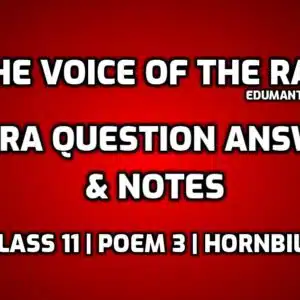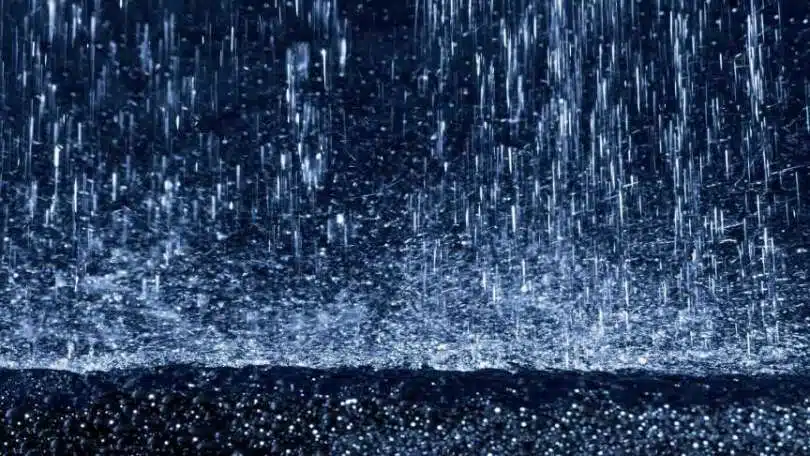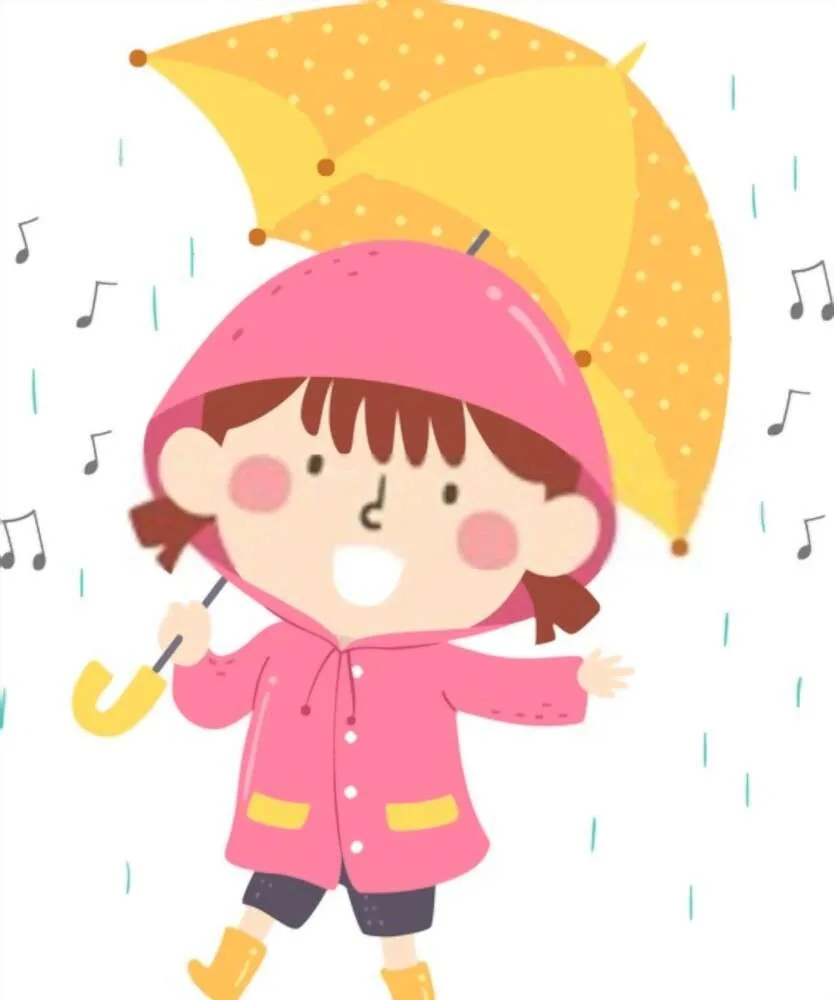
We hope you are enjoying the The Voice of the Rain Extra Questions and Answers. Go through and add highest value to your studies.
Extra Questions, Notes, Assignment and study material for Class 11th as Per CBSE Syllabus
Chapter- 3.1 English Language and Literature
The Voice of the Rain Extra Questions and Answers
By- Walt Whitman
Introduction of the lesson- The Voice of the Rain

The Voice of the Rain is the statement of facts in an imaginary dialogue form. It traces the life-story of clouds. Clouds are the transformed shapes of water. They cannot be touched but are the saviours of Nature and all forms of life on the earth. The rain is the song of the Earth. The water moves in a definite order. It turns into light vapour, moves upward, wanders in the sky and finally returns to its birthplace lovingly. It is a boon for the dry earth and the drying vegetation. It removes all the layers of dust from every object. But above all, it waters the dry earth, enables the seeds to sprout, and makes everything clean as well as beautiful. The poet asks the question and the rain tells him all about its birth and end.
Short and Simple Summary of the lesson in English- The Voice of the Rain/ Summary in simple Words/ Critical appreciation of the lesson – The Voice of the Rain

The poet casually asks the gentle rain who she is. Surprisingly, the rain answers the question in detail and inhuman voice. The poet translates the statement of the rain into English.
The rain says that she is the song of Earth which is her birthplace and her mother. She is born out of the water bodies on the land and the vast sea. In the form of vapour, she rises upward, appears like dark clouds, cannot be touched, yet it stays on the sky for a short period before falling down in the form of rain. It follows the cycle of birth, growth and returns to its original form.
The rain serves a heavenly purpose. It fights drought (dry) conditions on the earth and waters the soil. It washes away the layers of dust and helps the seeds to sprout again. This cycle goes on eternally. It serves the divine function of giving back life to dry earth and drying plants. It makes all earthly things clean, pure, fertile and beautiful. It fulfils the purpose of its birth, its chain of duties and returns to the earth lovingly in water form. It doesn’t bother whether its services are heeded/noted or not.
Summary in Hindi – The Voice of the Rain
कवि सहजभाव से हल्की फुहार से प्रश्न कर बैठता है कि तुम हो कौन I हैरान कर देने वाली बात यह हुई कि वर्षा उस प्रश्न का उत्तर विस्तार से तथा मानवों वाली भाषा में देती है I कभी उस कथन का अनुवाद अंग्रेजी में कर देता है I

वर्षा कहती है कि में तो धरती का गीत हूँ, वही धरती जो मेरी जन्मस्थली है और जननी भी I मेरा जन्म भूमि पर फैले जल भराव वाले स्थानों तथा विशाल समुद्रों से होता है I गैस के रूप में मैं ऊपर उठ जाती हूँ, काले मेघों का रूप धारण कर लेती हूँ I मुझे छुआ पकड़ा नहीं जा सका फिर भी आकाश में मेरा ठहराव थोड़े समय के लिए ही होता है मैं जन्म, विकास तथा मूलरूप से पृथ्वी पर लौटने का चक्र पूरा करती हूँ I
वर्षा एक दैवी उद्देश्य की पूर्ति करती है I वह पृथ्वी पर सूखे की स्थिति से लड़ती है; भूमि को सींचती है; तथा धूल की पर्तों को धोकर बहा देती है, और बीजों को पुनः अंकुरित होने में मदद देती है I यह चक्र निरन्तर चलता रहता है I यह एक दैवी प्रक्रिया है जो सूखी धरती तथा मुरझाते पौधों को नया जीवन दे देती है वर्षा सभी पार्थिव वस्तुओं की सफाई करके उन्हें विशुद्ध, उपचार तथा सुन्दर बना देती है I यह अपने जन्म का उद्देश्य पूरा करती है, अपने कर्तव्यों का निर्वाह करती है तथा पृथ्वी पर पुनः प्यार पूर्वक जल के रूप में लौट आती है I यह इस बात की भी चिंता नहीं करती कि इसकी सेवाओं को पहचाना जा रहा है अथवा नहीं I
Stanzas for Comprehension The Voice of the Rain
(1)
Read the stanza carefully and answer the questions that follow :
And who art thou? said I to the soft-falling shower,
Which, strange to tell, gave me an answer, as here translated:
I am the Poem of Earth, said the voice of the rain,
Word-Notes
art—are; thou—you; soft falling—falling gently and without much noise; shower—light rain; poem of the Earth—Song. The life-cycle of clouds and rain starts when the hot sun vaporises the water on the earth. The same gaseous clouds then dissolve into the water again and return to the earth.
और आप हैं कौन ? मैंने हल्की गिरती फुहारों से पूछा I विचित्र बात यह हुई कि वर्षा ने मुझे एक उत्तर दिया जिसका अनुवाद मैं यहाँ कर रहा हूँ I मैं तो धरती का गीत हूँ ; बर्षा ने अपनी भाषा में मुझे बताया I
Questions
(i) Name the poem and the poet.
(ii) What does the phrase strange to tell mean?
(iii) Why does the rain call herself the ‘Poem of the Earth’?
Ans.
(i) The title of the poem is ‘The Voice of the Rain’. The poet’s name is Walt Whitman.
(ii) ‘Strange to tell’ sounds a note or exclamation of surprise. The poet had not expected to get an answer inhuman voice from the rain.
(iii) The rain has its birthplace in the river bodies and season the earth. It is the lovely and musical child of the earth.
(2)
Eternal I rise impalpable out of the land and the bottomless sea,
Upward to heaven, whence, vaguely formed, altogether changed, and yet the same,
I descend to lave the droughts, atomics, dust-layers of the globe.
And all that in them without me were seeds only, latent, unborn;
Word-Notes
eternal—with no end, continuously: I-the rain; impalpable–something that cannot be touched. not solid but in the form of gas or vapour. The hot sun transforms water in rivers and the sea into vapour, which being light, rises towards the sky: whence–from where; vaguely–not properly; altogether changed–the water takes on the new shape of clouds; descend–fall down, return; lave–wash, bathe; droughts–dry situations; atomies–very small particles: dust-layers–deposits of fine dust settled on every object on the earth: globe–the whole world; latent–hidden inside.
मैं अनवरत रूप से पृथ्वी और तलहीन सागर से वाष्प के रूप में ऊपर आकाश की ओर उठ जाती हूँ जहाँ मेरा रूप- रंग या आकार टेढ़ा-मेढ़ा होता है I मैं पानी का पूर्णरूप से बदला हुआ रूप हूँ फिर भी मैं अंदर से तो जल ही हूँ; मैं फिर पृथ्वी पर पुनः उतर आती हूँ I शुष्क धरती को, सूक्ष्म कणों को तथा पूरी पृथ्वी की वस्तुओं पर जमी धूल की परतों को धोकर साफ कर देती हूँ I पृथ्वी पर जितनी भी चीजें हैं वे मेरे जल के बिना बीजरूप में ही धूल में दबी अजन्मी पड़ी रहती हैं I मैं ही उन्हें नवजीवन देती हूँ I
Questions
(i) There are two voices in the poem. Who do they belong to?
(ii) How does the rain narrate the story of her birth and functions?
(iii) What impression do you form about the speaker?
Ans.
(i) The two voices in the poem are those of the poet and the rain.
(ii) The rain rises from the earth in the form of light vapour which takes on the shape of dark, dense clouds. The clouds after wandering all over in the sky dissolve again into water and return to their birthplace. Thus rain gives new life and greenery to the dry earth.
(iii) The speaker ‘the rain’ gives a scientific account of her birth and gifts to the drying earth. She tells her life-story with pride and self-praise.
(3)
And forever, by day and night, I give back life to my own origin,
And make pure and beautify it;
(For the song, issuing from its birthplace, after fulfilment, wandering
Reck’d or unreck’d, duly with love returns).
Word-Notes
for ever–always; my own origin–the water-bodies like rivers, ponds and seas: give back life–quench their thirst, fill them to the brim; pure–clean, dust-free; beautify–add beauty, the two functions of the rain are to cleanse everything and to add beauty to them; song-the rain is the song or poem of the earth; issuing–rising; birth-place–rivers, ponds and the sea.: after fulfilment–after fulfilling my dream or wish or duty; wandering–roving, floating in the sky; reckd–eared for, noticed: unchecked-ignored, unnoticed; duly–rightly, at the proper time: with love returns—the rain that goes up in a gaseous form returns lovingly to the earth, quenching its thirst.
और सदैव रात-दिन, मैं अपनी जन्मस्थली धरती को नया जीवन देती रहती हूँ, इतना ही नहीं, पृथ्वी को विशुद्ध साफ-सुथरी तथा सुन्दर भी बना देती हूँ I (क्योंकि मैं जो पृथ्वी का गीत हूँ, अपनी जन्मस्थली से निकलकर अपनी परिभ्रमण की इच्छा पूरी करके आकाश में घूम-फिरकर सप्रेम उस जल को धरती पर को लौटा देती हूँ, चाहे लोग इस बात को देख पाएँ या अनदेखा कर दें I
Questions
(i) How is the cyclic movement of rain brought out in the poem?
(ii) What is the significance of the word ‘song’ here?
(iii) How does the rain benefit the earth?
Ans.
(i) The poem gives us a clear picture of how the clouds are formed and how they dissolve into the water again. They have a short life-span.
(ii) The word ‘song’ refers to the musical sound which can be heard when the rain falls on different surfaces on the earth.
(iii) The rain is a great benefactor of the earth. It cleanses, purifies and waters the dry earth. It gives a new life and beauty to the scorched fields and all the living beings.
Very Short Answer Type Important Questions The Voice of the Rain
1. Why does the poet call this poem a ‘translation’?
Ans. The voice of the rain is naturally mysterious and is different from our own. So, the poet who alone understands it translates the reply of the rain into English.
2. What is the life-cycle of clouds?
Ans. Clouds are nothing but water in the form of gas. The scorching sun turns the water on land and sea into vapour. The water vapours rise upwards like dark clouds and float in the sky. Finally, the clouds again return to their birthplace in the form of rain.
3. What question does the poet ask for the rain? What reply does he get?
Ans. The poet asks the rain who she is. The rain in its mysterious voice introduces herself as Poem of the Earth.
4. What is the cloud’s birthplace? How does it go upward to heaven?
Ans. The cloud’s birthplace is the water bodies like rivers, ponds and the sea. Water vapours being lighter than air, rise to the sky and take on strange shapes in the form of clouds. Yet essentially, it remains the same old water.
5. What are the functions of the cloud or rain?
Ans. The rain bathes everything on the earth, washes away dust layers, cures dry conditions. and gives a new life to seeds. In this way, it cleans, purifies and beautifies all things on the earth.
6. What is the central idea of Walt Whitman’s poem?
Ans. The poet wants to convey the birth, growth, change and finally the blessings of rain. It is water that turns into clouds, wanders in the sky, takes on strange shapes, but finally in the form of water returns to the earth. It purifies, bathes and adds beauty to all things on the earth. Rain does its duty unmindful of any recognition. Human beings should learn a lesson from this and make efforts to preserve the Earth.
Important Long/ Detailed Answer Type Questions- to be answered in about 100 -150 words each Value based questions- The Voice of the Rain
1. Rain does its duty unmindful of any recognition. A great lesson is hidden here. What is that?
Ans. Rain is the song of the Earth which is its birthplace and so its mother. It does not forget its mother and relentlessly works to make her mother all green, happy and worth living. It washes away the layers of dust and helps the seeds to sprout again. It gives life to dry earth and drying plants. In a way, it makes all earthly things clean, pure, fertile and beautiful. It fulfils the purpose of its birth by doing different duties and finally returns to its mother and rests in her lap. These services rendered by the rain are taken for granted and the rain does not mind it. All this contains a hidden message for mankind.
Man must do whatever he can to enhance the beauty and splendour of this earth which is his mother. But in reality, he leaves no stone unturned to destroy his mother. He is ever-ready to exploit her and leave her destitute. He forgets that by doing so he is destroying himself and leaving nothing for his progeny. Unlike the rain, he tries his best to milk the mother earth to the maximum and leave her all day. He should not do that. He should rather do everything to keep his mother earth life-giving for all times to come. He should respect natural resources and give them some space for renewal. If he does that, it will be the greatest service he will be doing not only to his mother earth but also towards all living beings.
[pt_view id=”68580a548v”]